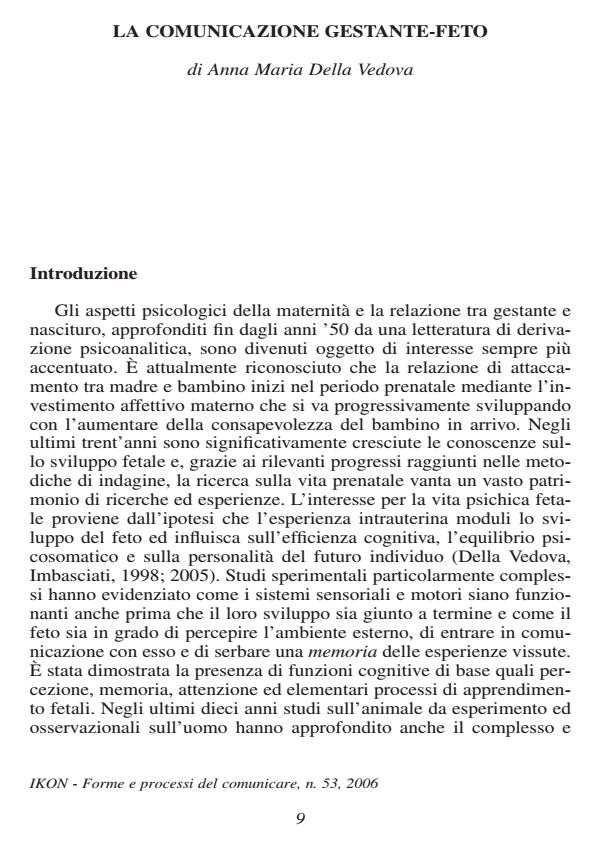La comunicazione gestante-feto
Titolo Rivista IKON
Autori/Curatori Vedova Anna Maria Della
Anno di pubblicazione 2009 Fascicolo 2006/53
Lingua Italiano Numero pagine 29 P. 9-37 Dimensione file 624 KB
DOI 10.3280/IKR2006-053002
Il DOI è il codice a barre della proprietà intellettuale: per saperne di più
clicca qui
Qui sotto puoi vedere in anteprima la prima pagina di questo articolo.
Se questo articolo ti interessa, lo puoi acquistare (e scaricare in formato pdf) seguendo le facili indicazioni per acquistare il download credit. Acquista Download Credits per scaricare questo Articolo in formato PDF

FrancoAngeli è membro della Publishers International Linking Association, Inc (PILA)associazione indipendente e non profit per facilitare (attraverso i servizi tecnologici implementati da CrossRef.org) l’accesso degli studiosi ai contenuti digitali nelle pubblicazioni professionali e scientifiche
La comunicazione gestante-feto - The prenatal origin of the parent-child relationship was proposed in the past century by authors from a psychoanalytical domain affirming the relevance of the parent’s affective investment in the unborn baby. Extensive literature focused on psychological processes involved in transition to motherhood like adaptation to pregnancy, maternal role attainment, maternal identity forming and maternal representation of the unborn baby. During pregnancy the woman gradually becomes aware of the foetus as an individual being, increasingly recognizing the separate person. In the last twenty years literature has brought evidence to organized foetal sensory-motor behaviour, auditive competence and foetal learning capability as from the fifth month of gestation. These foetal abilities in turn contribute to the increasing maternal awareness of the foetus which seems to be crucial in establishing the mother’s attachment to her unborn baby. Mothers often report interaction with their unborn babies by talking or caressing the baby in the tummy. This early communication is supposed to have an influence on the development of the baby’s mind. In the uterus it is particularly easy for the fetus to catch the sonorous or tactile maternal stimulus and consequently the growing nervous system and the developing cortical areas may receive a specific stimulation. Moreover the emotional communication between the mother and foetus has been explored. Animal experimentation and human observational studies have pointed out a relationship between maternal depression or anxiety and the impairment of the fetal nervous system due to the exposition to maternal cortisol. Presence of anxious and depressive symptoms in pregnancy is common and is related to premature birth risk, obstetrical complications, lack in the mother’s prenatal care of herself and her baby and persists in a high number of cases in post partum depression. Based on this evidence the consideration of the foetus as a sensible, communicative and vulnerable person becomes very important as well as the promotion of pre and perinatal maternal mental health must be a priority.
Vedova Anna Maria Della, La comunicazione gestante-feto in "IKON" 53/2006, pp 9-37, DOI: 10.3280/IKR2006-053002